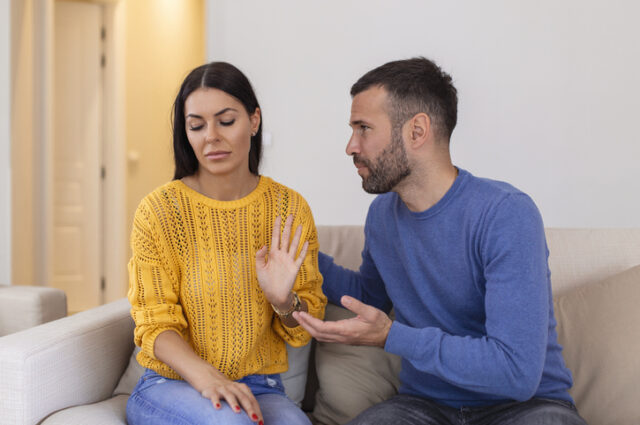While you should never stay in a relationship that makes you unhappy, some people break up for some pretty ridiculous reasons.

Sometimes, people walk away from genuinely good relationships for the wrong motives—usually based on fear, outside pressure, or plain old overthinking. If any of these reasons sound familiar, it might not be the relationship that’s the issue. And in fact, you could end up losing one of the best things you’ve ever had by jumping ship pre-emptively.
1. You had one bad argument.

No relationship is argument-free, and one fight—no matter how intense—doesn’t mean it’s doomed. Conflict can actually strengthen a relationship when handled well. Expecting constant harmony sets you up for disappointment. If you’re ready to walk away after one heated exchange, it might say more about your conflict tolerance than the quality of the connection. Growth often comes through working through the hard stuff, not avoiding it altogether.
2. Things aren’t exciting every day.

Relationships have seasons. That thrilling new-relationship energy naturally settles into something quieter as time goes on. If you confuse calm with boring, you might walk away from something stable in search of a high that won’t last. Long-term love isn’t fireworks every day—it’s consistency, safety, and shared moments that feel like home. Expecting constant excitement can stop you from appreciating the good right in front of you.
3. You’re afraid of how serious it’s getting.

When things start to deepen, it can trigger fear, especially if you’ve been hurt before. Some people end relationships not because anything is wrong, but because they’re scared of being vulnerable again. If commitment feels like a threat rather than a step forward, it’s worth looking at what’s underneath that fear before throwing away something meaningful. Sometimes the fear isn’t about the person. It’s about past baggage.
4. You think the spark should be effortless forever.

The beginning of a relationship often feels effortless, but keeping connection alive takes intention. If you expect it to always feel like the first month, you’ll probably leave as soon as effort is required. That spark doesn’t have to fade, but it does evolve. Choosing to nurture it through small, consistent actions is what keeps love feeling alive. Waiting for it to just magically sustain itself is where people go wrong.
5. You compared your relationship to someone else’s.

Whether it’s a friend’s picture-perfect feed or a couple you idealise, comparison is a relationship killer. What you see from the outside is never the full story, and chasing someone else’s dynamic can make you lose sight of your own. What works for another couple might not fit you at all. Ending a relationship because it doesn’t “look like” someone else’s usually leads to regret. Focus on how it feels, not how it performs externally.
6. You were in a mood and made a snap decision.

Emotions can get big in the moment, and it’s easy to say things you don’t mean—like threatening to leave or actually walking away impulsively. However, temporary emotions shouldn’t drive permanent decisions. Give yourself time to cool down before making relationship-ending calls. If something still feels off after reflection, that’s different. But don’t break something because you were overwhelmed in the heat of the moment.
7. You’re afraid of “missing out” on other people.

When you’re in a good relationship, the idea of other possibilities might still pop up, but chasing the fantasy of something “better” often ends with you missing what you already had. No partner is perfect, and no relationship is without trade-offs. Leaving a solid connection for the idea of endless options is a recipe for dissatisfaction. Being content in a relationship sometimes means ignoring the fear of greener grass and choosing depth over novelty.
8. You’re uncomfortable with intimacy.

Some people unconsciously sabotage relationships the moment things start to get real. If you’ve always struggled with emotional closeness, it can feel safer to pull away than to risk truly being seen. However, ending something just because someone’s getting closer is a protective reflex—not a solid reason. If intimacy feels like a threat, the work might need to happen within you before you let go of someone who’s actually showing up for you.
9. You’ve hit a rough patch and think it’ll stay that way.

Every long-term relationship will go through lulls—stressful times, less connection, or external pressures that affect how you relate. Assuming that a tough period means the whole thing is broken is short-sighted.
If your pattern is to bail the moment things stop feeling easy, you might be walking away from people who would have stayed if the roles were reversed. Rough patches can pass. Don’t mistake them for dealbreakers if the foundation is still strong.
10. You’re listening too much to outside opinions.

When friends or family don’t fully approve of your partner, it can cloud your judgement. However, the people outside your relationship don’t experience it the way you do—they see fragments, not the full picture. If the relationship feels right to you and there’s respect, care, and connection, that matters more than external noise. Ending something just because someone else doesn’t “get it” often leads to regret once the dust settles.
11. You haven’t communicated what’s bothering you.

Ending a relationship without first expressing your needs gives the other person zero chance to show up differently. Expecting someone to read your mind or just “get it” often leads to premature exits. Good relationships are built through honest communication, not silent scorekeeping. If you’re frustrated, say something. If you need change, ask for it. Leaving without trying to talk is rarely the high road—it’s often just the easier one.
12. You feel like it’s too good to be true.

If you’re not used to being treated well, receiving healthy love might feel suspicious. Some people end great relationships simply because they’re waiting for the catch, and when it doesn’t come, they create one. The fear of happiness is more common than you’d think. But sabotaging something real just because it’s unfamiliar can leave you stuck in cycles of emotional self-protection. Sometimes, it really is just… good.
13. You’re bored because there’s no chaos.

If your past relationships were full of drama or emotional rollercoasters, a calm, healthy relationship might feel “off” at first. It’s not that the current one is lacking—it’s that your nervous system isn’t used to peace. Leaving because there’s no chaos often means you’re addicted to the emotional highs and lows of toxic dynamics. But good love isn’t boring—it’s stable. That can take some getting used to if dysfunction once felt like love.
14. You want someone to “rescue” you emotionally.

Sometimes people expect a relationship to fix loneliness, sadness, or dissatisfaction with life, and when it doesn’t, they blame the partner. Of course, no one can be your emotional solution. That work has to happen within. If you’re expecting a relationship to be your escape hatch, you’ll always end up disappointed. Leaving because someone didn’t fix what was never theirs to fix will just leave you carrying the same emptiness into the next one.
15. You think love should always feel effortless.

It’s easy to romanticise the idea that love shouldn’t take work. But even the healthiest connections need attention, communication, and adjustment. Thinking effort means failure is one of the most common relationship myths out there. If you leave every time things require growth, you’ll keep restarting from scratch. Good love might be simple, but it’s not passive. It’s made of active choices, not just feelings.
16. You’ve hit a milestone and panicked.

Sometimes things get real—moving in, talking about kids, getting serious—and you suddenly want to bolt. That knee-jerk reaction doesn’t always mean you’re with the wrong person. It might just mean your fears are louder than your trust.
Walking away because you hit a milestone you weren’t ready for is understandable, but it’s not always wise. Talk about it. Take a pause if you need it, but don’t run just because your anxiety got triggered by the next step.
17. You’re worried about what the relationship says about you.

Sometimes we let ego drive the ship. Maybe the relationship doesn’t fit your carefully curated identity, or your partner doesn’t “match” what people expect from you, so you walk away to protect an image. However, leaving someone kind, supportive, and aligned with you just because they don’t fit the story you tell the world often leads to emptiness. Relationships are lived, not performed. Don’t let perception outweigh actual connection.
18. You feel like love should just happen, not be built.

Movies have trained us to believe that when it’s “right,” everything just clicks, but real love is less lightning bolt, more slow burn. Expecting it to always be effortless and intuitive sets you up to feel constantly disappointed. If you leave every time things don’t unfold like a romance plot, you’ll keep missing out on the kind of love that grows deeper with time. Good relationships evolve, and sometimes they start with less spark and more stability.
19. You’re scared of losing independence.

Getting close can trigger the fear of being consumed, controlled, or losing your sense of self. So instead of working through that, some people pull away entirely, even when the relationship is healthy and balanced. If your identity feels threatened by closeness, the issue might not be the relationship—it might be your own relationship with vulnerability. Walking away won’t fix that fear. Facing it will.
20. You’re acting out of fear, not clarity.

The worst breakups often come from impulse—fear of being hurt, fear of being wrong, fear of missing something better. Fear clouds judgement and makes everything feel urgent, but good decisions aren’t made in panic. If you’re thinking of ending things, pause and ask: is this a response to discomfort or a deeper truth? Walking away might feel like relief in the moment, but if it’s fear driving it, it usually doesn’t last.




